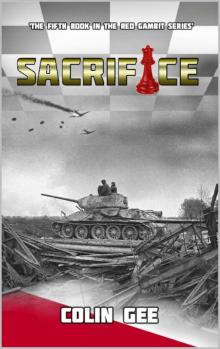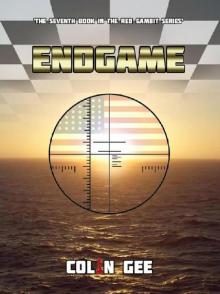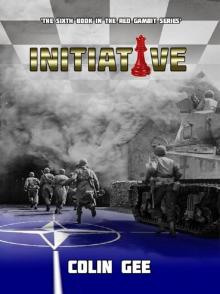Initiative (The Red Gambit Series Book 6) Read online
Page 9
Beware most strictly of any outbursts of emotion that may engender needless complications, of any fraternal contention and strife that may create confusion, lead you astray, and cause you to lose the confidence of the world.
Let the entire nation continue as one family from generation to generation, ever firm in its faith of the imperishableness of its divine land, and mindful of its heavy burden of responsibilities, and the long road before it. Unite your total strength to be devoted to the construction for the future. Cultivate the ways of rectitude, nobility of spirit, and work with resolution so that you may enhance the innate glory of the Imperial State and keep pace with the progress of the world.”
‘Kimigayo’ resurfaced, stronger in tone and volume, the choral version seemingly carrying with it the sorrow and indignation of a nation.
President Truman opened his eyes and looked around him.
Many of his closest aides showed the tracks of tears on their faces; others showed huge relief.
All had relaxed as the tension had drained away with each word from the Emperor’s mouth.
“Thank God for that.”
The murmurs rose quickly and died away, as they all realised that Truman had something to say.
“Now, send orders to our Pacific and Asian units to stand fast. Act in self-defence only. Cancel all offensive operations across the board. Remain vigilant and accept no risks. You all know what we’ve discussed, so put it into action.”
Most rose or moved to go, but Truman raised his voice, giving each man a moment’s pause.
“None the less, let no man under your control drop his guard, and do not think that we are victorious, for we are not. One great evil has fallen, but one, the greater one, remains.”
He stood and tugged his jacket into place.
“Remember this. Our victory over Japan will grant us some leeway with our public. Let’s use it to the best of our ability, gentlemen.”
The assembly spilt up as Truman sat at his desk, and prepared himself for the call to Churchill.
They tell us that suicide is the greatest piece of cowardice… that suicide is wrong, when it is quite obvious that there is nothing in the world to which every man has a more unassailable right than to his own life and person.
Arthur Schopenhauer.
Chapter 153 – THE RONIN
1127 hrs, Monday 10th June 1946, Height 404, Baisha River, Zhujiawan, China.
What was left of the Rainbow Brigade was gathered in defence of Routes 4 and 107, and the crossing of the Baisha River, protecting the approaches to Chenzhou.
Such as they could.
The Special Obligation Units were comprised of men who had given their all, and who had almost nothing left to give.
Four tanks were in camouflaged positions, overseeing the bridge south of Zhujiawan, one Panther on each flank, each with a small security force to protect it from stalking AT teams.
A Soviet T34m44, found abandoned during the great retreat, had been pressed into service, and formed the mobile reserve, complete with its own grape of infantry.
Centrally, the last surviving Shinhoto Chi-Ha supported the main infantry force, dug-in to oppose use of the bridge.
There was no explosive with which to destroy the structure, in fact, there was little of anything.
The three mortars had seven rounds between them.
Infantry weapons had one or two magazines available; those men with an extra clip or magazine said nothing, hoarding the means of self-protection.
The two Panthers had no machine-gun ammunition at all, and none of the best AP rounds.
It was a total miracle that the Panthers were still running at all, the German workshop engineers long-since departed into the next world. The remaining spare parts would barely fill a large suitcase, and no one was under any illusions that any breakdown would be terminal for the two remaining vehicles.
Cannibalism of wrecks and excellent work by the brigade’s Japanese mechanics had kept the two Panzer Vs going, all be it the engine performance was a shadow of that it had been when the vehicles arrived with the Rainbow brigade.
Nomori Hamuda, long since promoted to Major and commander of 1st Tank Battalion, gave up Panther ‘Masami’, placing it in the capable hands of Captain, the Marquis Hirohata, whose own Panther had been lost the previous New Year’s Eve.
Masami took the right flank, at the very western end of the defensive position.
Panther ‘Ashita’ and her commander, Sergeant Major Kagamutsu, took the left end of the line, the heavily camouflaged tank barely discernible from ten feet away, let alone to the enemy ground attack aircraft that constantly savaged the Japanese and Soviet troops in China.
Forty-seven kill rings adorned Ashita’s barrel, a testament to Kagamutsu’s command capabilities, as well as to the skill of her gunner.
Both Panthers had been topped off with as much fuel as they could take, which left less than one hundred litres available.
Out in front of the position, Sergeant Major Haro patrolled in a liberated Dodge 4x4, his old Marmon Herrington now a distant rusting memory.
Hamuda swept the approaches with his binoculars, seeing nothing but the occasional glimpse of a Chinese civilian going about their business.
He also swept the skies, conscious of the damage that the Yankee air force had inflicted upon his men.
His mind wandered…
‘…Sakita’.
The popular Sergeant Sakita had been obliterated in his Panther tank, three enemy aircraft pouncing on the vehicle as it tried to cross a small bridge the previous January.
Bridge and tank had disappeared, and there was nothing left to salvage for an honourable burial.
There were so many names whirring through his mind, all comrades now departed, far too many to recall, although Hamuda conjured up many faces during whatever restless hours of sleep he could manage.
By his side, Yamagiri, commander of the surviving infantry, was tying a headscarf around himself, his face set in a vision of resignation, his signature sunglasses long since lost in the heat of battle for some godforsaken corner of China.
The Emperor’s address had been listened to, as ordered by High Command, and caused wailing and tears amongst men who had given their all in the Imperial cause, only to see everything come tumbling around their ears because of weakness back in the home islands.
Hamuda didn’t think it was an enemy fake, as some had decided once its’ message was clear.
Whatever it was, the very idea that the Emperor would ever order a humiliating surrender was unthinkable…
Unimaginable…
Unfollowable…
In any case, the last survivors of the 3rd Special Obligation Brigade ‘Rainbow’ had no intention of surrendering.
Ninety-seven men had decided to continue the fight, knowing that they would not survive the day.
Fig# 181 – The Baisha River, Zhujiawan, China.
Haro had ordered his captured Dodge to pull into the animal pen on the side of Hill 402, a location well positioned above the roads, his ears having caught the betraying sound of tanks on the move.
Scuttling to the damaged wall that opened up to the roads that ran through the village of Zhaigongshan, he was horrified to see armored-infantry moving on foot through the rough lanes in the village, rooting out anyone they found, just in case of ambush.
Down Routes 4 and 107 came columns headed by halftracks and the big American Pershing tanks, again flanked by business like infantrymen.
As his radioman prepared the set, Haro made a swift calculation.
Sixty plus tanks of different types, but mainly the Pershing, equalled an enemy tank battalion or equivalent.
There were enough halftracks and other vehicles in sight to suggest a complete armored-infantry battalion plus change.
Fig # 182 - Opposing forces at the Baisha River, China.
Haro took hold of the handset but stopped suddenly, as one of the leading vehicles started to talk, or at least, th
at was how it seemed to him at first.
A halftrack had been equipped with speakers, and an excited man fluent in Japanese loudly implored any troops listening to observe the will of their Emperor, lay down their arms, and declare themselves.
Neither Haro nor his radioman gave the propaganda any thought, and the NCO sent his contact report to Hamuda.
“Sunflower-seven, sunflower-seven to Buffalo, over.”
Hamuda acknowledged, again seeking information with his binoculars as the contact report came in.
He found movement almost immediately, but waited until Haro had finished his broadcast.
“Buffalo to Sunflower-seven, fall back to the south and reconnoitre our southern flank to Zhoujiawan. Cross over the river and return once mission is complete, over.”
“Buffalo, your message understood, Sunflower-seven over.”
Hamuda was already thumbing the microphone, issuing orders to his meagre force.
They were simple orders.
Wait for the command to fire, fire accurately, and kill as many of the Americans as possible before the enemy killed them.
There would be no retreat.
The Dodge slipped quietly away, using the rise to mask it from the heavy column in Zhaigongshan.
However, it didn’t mask the light vehicle from above, and a circling spotter aircraft called in a contact report to some Recon elements operating south of Hill 402.
Haro spotted the enemy pursuit as soon as it slipped out from behind a spur of high ground, the leading M8 Greyhound displaying more than enough speed to run them down in short order.
He issued a command and the dodge cut through the ground, sending clods of earth in all direction, as it made a swift right hand turn and headed towards the enemy force.
The MG34, his favourite weapon, salvaged from the wreck of his Marmon-Herrington, discharged the final thirty-five rounds left in its belt.
Fig # 183 - Baisha River battle.
The rearmost soldier had no chance to add to matters before his head exploded like a ripe melon as two .50cal rounds transited the skull side by side.
Haro reached for his pistol but the impact of a.50cal round blasted his shoulder virtually off his body, the partially attached right arm flopping uselessly by his side.
Two half-tracks had moved out to the flanks of the Greyhound, and it was one of these that put a few choice rounds on target.
The driver felt the loss of power, as heavy bullets wrecked the engine, and then had other priorities as a.50cal passed through his left knee and travelled all the way through his thigh, splitting and destroying bone, until it exited through his backside.
Both men screamed as the Dodge coasted to a halt.
‘Take no chances’ was the very specific order issued by the Recon Battalion CO, and it was an order that the cavalry troopers intended to observe to the letter.
The six-wheeled Greyhound stopped thirty yards short of the disabled Dodge.
The driver, screaming with pain and indignity in equal measure, scrabbled for his rifle.
Haro, his right arm and shoulder flapping grotesquely as he stood up, waved his left hand, the contents of which were unclear to the watchful American soldiers.
The order was given, and the Greyhound’s gunner fired the 37mm M6, shredding flesh and metal with a close range canister round.
1141 hrs, Monday 10th June 1946, Height 404, Baisha River, Zhujiawan, China.
The sound of heavy machine guns ended and a single heavier thump was the last sound of battle from across the river.
Efforts to raise Sunflower-seven were fruitless, and Hamuda correctly surmised that Haro and his men were dead, or worse, prisoners.
Thoughts of his comrades were swiftly brushed aside as enemy tanks and soldiers spilled out into the countryside across the river, the numbers growing every second he watched.
Snatching up the radio, Hamuda took in the situation, understanding that the final act was upon them.
He hesitated, the radio unused in his hand.
‘Why am I waiting?’
The leading American tanks opened fire on the move, their shells arriving on the north bank in an instant, throwing up gouts of earth and vegetation.
“Buffalo calling, Masami, Ashita, acknowledge.”
“Masami, over.”
“Ashita, over.”
“Buffalo calling, all units hold fire, except for Masami and Ashita, engage immediately, out.”
The two 75mm shells flew over the battlefield and sought out an enemy tank.
Masami’s round missed high, but Ashita’s struck the turret of the lead vehicle.
The Pershing shrugged off the hit with no apparent effect.
An exchange of rounds followed, as the US tanks opened up on their now revealed enemy.
Behind them, the other Pershings, the remainder of the tank battalion, had drawn up on the edge of some raised ground, using the defile to conceal their presence and intentions.
Firing from fixed positions, their rounds flew straight and true.
The ‘beauty’ that was Masami came apart under numerous impacts, the German armour succumbing to the heavy 90mm strikes.
Hirohata was blasted out from the turret by the first impact, rising into the air like a faulty firework, his battered body falling into soft undergrowth, preventing further damage from being added to his several new injuries.
His crew died inside the smashed Panther.
Shells continued to strike Masami, as she refused to catch alight and reveal her death.
Eventually, one struck home and set her afire, but even then, the fire was gentle, almost as if the battle-scarred tank still fought to retain her dignity.
On the eastern end of the line, shells had chewed up the ground around Ashita, and three had struck her cleanly, but none had penetrated or caused her major harm.
Sergeant Major Kagamutsu engaged the tank battalion to his front, now supported by the T34, which Hamuda had called forward.
Hamuda saw the wave of leading tanks drop down behind a small rise the other side of the river.
They did not reappear.
He understood immediately.
“Buffalo, all units, all units. Relocate immediately, relocate immediately!”
His understanding was punctuated by the sharp crack of tank guns, and immediately reinforced by the bursting of smoke shells in and around all his defensive positions.
The rush had been a simple ruse, one he had fallen for… had no alternative but to fall for…
A machine gun nearby chattered, the desperation of the gunner marked by an increased wailing as his target drew closer, and closer.
Voices were raised, fear and indignation carried in the words.
“Aircraft! Yankee aircraft!”
‘… fakku!’
“Buffalo, all units, Air attack!”
1157 hrs, Monday 10th June 1946, airborne over Baisha River valley, Zhujiawan, China.
In answer to the calls from the commander of CCB, 20th US Armored Division, two squadrons of Marine aviators were detached from the waiting queue of support aircraft, part of the Commanding General’s plan to limit risk and reduce casualties when dealing with the last fanatical pockets of Japanese resistance.
Leading the way were VMF-312, a Marine fighter squadron riding FG-1 Corsairs, decked out with the distinctive checkerboard markings of their unit.
Three minutes behind them were the F8F-1 Bearcats of VF-191, working from a shore base whilst their carrier, USS Antietam, was away getting her bow welded back on after an encounter with an enemy mine.
The Corsairs attacked in line, not column, a deadly line that was three aircraft wide.
Sweeping in from over the top of the US ground force, the leading element selected one target each.
The T34, the Shinhoto, and ‘Ashita’.
Each aircraft discharged six 5” HVARs, deadly high velocity rockets, universally known as ‘Holy Moses.’
Not one struck its target, although i
n the case of the Shinhoto Chi-ha, two were close enough to kill it and its crew.
The machine-gun near Hamuda rattled out its final rounds, and to good effect.
The right wingman knew he was in trouble, and he struggled to get some height, pulling his damaged aircraft up and around to bail out over friendly ground.
The Pratt and Whitney power plant decided otherwise, and fuel lines let go, bathing the hot engine with rich fuel.
In a second, the nose fireballed and the wave of heat blistered 1st Lieutenant Cowpens’ face.
Canopy back, he rolled the aircraft and fell out, his parachute grabbing at the air in an attempt to slow him sufficiently before impact with the ground.
Many in his squadron watched as the chute blossomed only moments before the screaming burden it carried hit the ground hard.
The anger that the pilots of VMF312 felt was all put into the attacks they made, the remaining aircraft repeating the line abreast attack, the fifteen aircraft making a total of five passes.
Impotent, Major Nomuri Hamuda watched as the T34 simply came apart under a number of hammer blows.
Miraculously, he saw a figure emerge from the wreckage, only to be consumed by a hail of high explosive as the next aircraft put his HVARs on the money.
The air attack coordinator, safely ensconced in his half-track, not far from Haro’s original observation position above the village of Zhaigongshan, knew his trade.
In his own way, he was an artist, but a very deadly one.
The simple notations on his map, made during the initial contact, were all he needed to steer the two Marine squadrons into an accurate killing frenzy.

 Sacrifice (The Red Gambit Series. Book 5)
Sacrifice (The Red Gambit Series. Book 5) Endgame (The Red Gambit Series Book 7)
Endgame (The Red Gambit Series Book 7) Initiative (The Red Gambit Series Book 6)
Initiative (The Red Gambit Series Book 6)